Over the course of four months, I sat with seven women — artists, caregivers, organizers, and revolutionaries — who have spent years living on the Outer Cape. They range in age from 60s to 80s, and they have shaped their communities in ways both public and deeply personal. What they offered in conversation — over lunch at SKIP, in living rooms, and around kitchen tables with hot tea and ripe cantaloupe — felt closer to incantation than instruction.
Their reflections, gathered here, are bright-edged and compressed — like sea glass, made smoother by time and salt. There are so many more pieces to find, if you look.
The Stoic
“I love myself better here,” said Marybeth Petri, 64. It wasn’t a boast. It was a line that had been lived in.
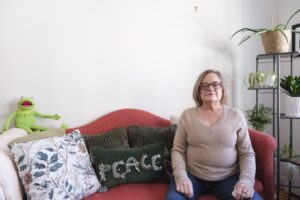
Petri first came to Provincetown in the 1980s. She met her now-ex-partner here, raised their daughter in Connecticut, and returned in 2017 — newly single, newly determined, and lucky enough to win a housing lottery for a one-bedroom on Nelson Avenue.
“I just truly believed that I belonged here,” she said. “I got myself back.”
There is a stillness to her presence, the kind that makes you want to listen more closely. She punctuates each day by writing in her journal. She drives neighbors to medical appointments, lunches regularly with friends at SKIP, and keeps a well-thumbed copy of The Daily Stoic on hand. A women’s group at Helping Our Women became a lifeline, especially after a breast cancer diagnosis three years ago.
“I may not be someone who gets on a bus to go march in Washington,” she said, “but I believe in the power of loving people and helping each other.”
Petri knows the fragility of stability: the specter of job loss, threats to health-care access, rising costs, and another Trump presidency all weigh on her. But she doesn’t spiral. She returns to one mantra: control what you can.
“Master your mind,” she said. “That’s all you can do. You can’t control what happens. But you can control how you think, how you feel, and what you choose to do.”
The Laughing Yogi
Dian Hamilton, 82, often eats lunch with Petri. She has moved eight times in six years, all to stay tethered to Provincetown. It’s a place, she said, that makes her brave.
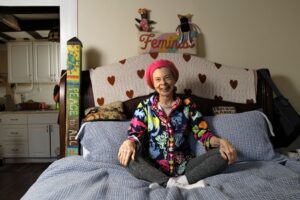
“It helps me make courageous decisions — to be in theater, to be in Cody Plays, to lead laughter yoga workshops,” she said. “People are rooting for me here.”
Hamilton came out during the women’s liberation movement when she was living in Philadelphia. She remembers marching in the streets and for the first time feeling that there was room for her.
“To understand what feminism means and consider myself a feminist was a highlight of my life,” she said. “I saw my own challenges more clearly.”
That early political awareness still buoys her. “Hold onto your ideals and what you believe in,” she said. “Speak up when you can — when it’s safe. We can create our life as we go along. And we can help heal and inspire others.”
The Black Sheep
Mary DeAngelis, 67, and Marian Roth, 81, met in Provincetown but arrived on very different tracks. Roth, a political scientist-turned-photographer and multimedia artist, earned her Ph.D. at 24 and went to war with the academy’s sexism with a kind of velvet defiance.
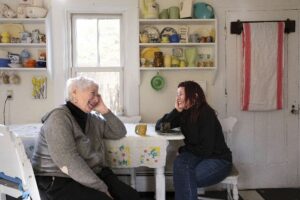
“There are things you cannot change,” Roth said. “But you still have to challenge power. Just saying, ‘I don’t believe you’ — that’s power.”
DeAngelis, a designer and artist, had nannied, waitressed, and traveled the world before creating a clothing line from scratch.
“I had to figure out how I could stay here and still live with myself,” DeAngelis said. “So, I made something up.”
What they built together — in love, partnership, and community engagement — is a life that holds contradictions: realism and joy, queerness and quiet. Provincetown, they said, gave them space to be black sheep — and to thrive.
“We made the world a better place for girls like us,” Roth said. “And we still believe in showing up. That’s how change happens.”
The Frog Lady
Sallie Tighe, 78, breaks into song mid-sentence. It’s not performative. It’s just how the story comes. She is a fixture onstage, at the Lobster Pot, and as Truro’s representative on the Barnstable County Assembly of Delegates.
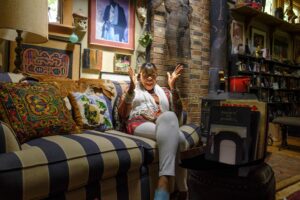
She does it out loud and on paper — a lyricism shaped by poetry, prose, and Black women writers like Audre Lorde and Nikki Giovanni, whom she read after enrolling in college at 39. That brought her closer to her history — to her mother and grandmother, who left sharecropping behind during the Great Migration. “They both took big steps to an unknown place,” she said.
When Tighe moved to Provincetown in 1973 with her then-partner and two young daughters, Audrey and Leslie, she didn’t expect to become a theater legend or sail the world or run a yarn shop. “I didn’t grow up thinking I was allowed to ask for anything,” she said. “But once I realized I had a choice — wow.”
She credits Portuguese women who offered child care; a principal at the local school who hired her twice; “Uncle Napi,” who gave them housing; and friends who nudged her toward the stage.
She now lives in Truro with her husband, Peter. Their home is filled with frog figurines, photos, and pride. She gives back through town committees and organizing for Juneteenth and Art Peacemakers of Wellfleet. “My life has been so rich, and I have been so loved — how could I not give back?”
The Experimental Playwright
Candace Perry, 77, did not grow up with a radical sensibility. Her father was in the Air Force, and they moved around the South, immersed in a more conservative culture. “If I’d been old enough in 1968,” she says, “I would’ve voted for Nixon.” But that was before moving to Washington, D.C., where the antiwar movement cracked her worldview open.
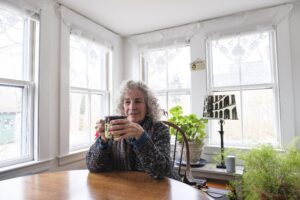
A five-decade career in social work followed, as did marriage, motherhood, and a second act as a playwright. She has written dozens of plays — funny, sharp, political — often seeded with themes of racism, misogyny, and outsiderhood. Her newest play, No Surrender, is about removing a statue of Robert E. Lee from New Orleans. The statue comes to life and ends up in an encampment for unhoused people.
“I like to write things that have social issues but not preaching or banging people over the head, so I use humor,” she said.
Her advice for younger people? Be in it for the long haul — and don’t go it alone. “Have friends in the cause with you. And remember: sometimes you also have to do other things. You have to find joy.”
The Spiritual Criminal
Anne Walsh, 82, came to Brewster in 2000 after chapters as a nun, teacher, radical, and mother. She enrolled at Cape Cod Community College soon after arriving to become a certified nursing aide.
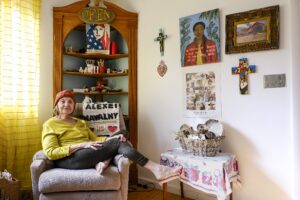
In 1961, she joined the Sisters of St. Joseph in Boston and taught elementary school. She left in 1968 with six other sisters as the Vietnam War escalated and the Catholic Church failed to take a stand. “Consciousness came out in its own style in the Catholic Left,” she said. “The signs of the time said we had to change what we did to make room for a wider view.”
For Walsh, that meant raids on draft boards in Boston, New York, and Philadelphia. It meant adopting her son from an orphanage in Saigon and marrying a former priest who was tried with the Milwaukee 14 after napalming draft records.
“We left because the church wasn’t moving quick enough 一 wouldn’t and couldn’t,” she said. “That’s the real mortal sin: to be silent in the face of carnage.”
Now, Walsh embraces a different kind of resistance. It’s quieter and more reflective. “Seizing solitude,” she calls it. She writes, quilts, and rethinks old instincts. Through the group “Building a Bigger Table” at the Unitarian Universalist Church in Brewster, she has helped resettle families from Ghana, Guatemala, Haiti, and Ukraine. She showed up to protest an ICE raid in Dennis Port in March.
“Change doesn’t come free of charge,” she said. “You have to pay for it with bravery.”
“You’re in this world — if you can, elevate it,” she added.



